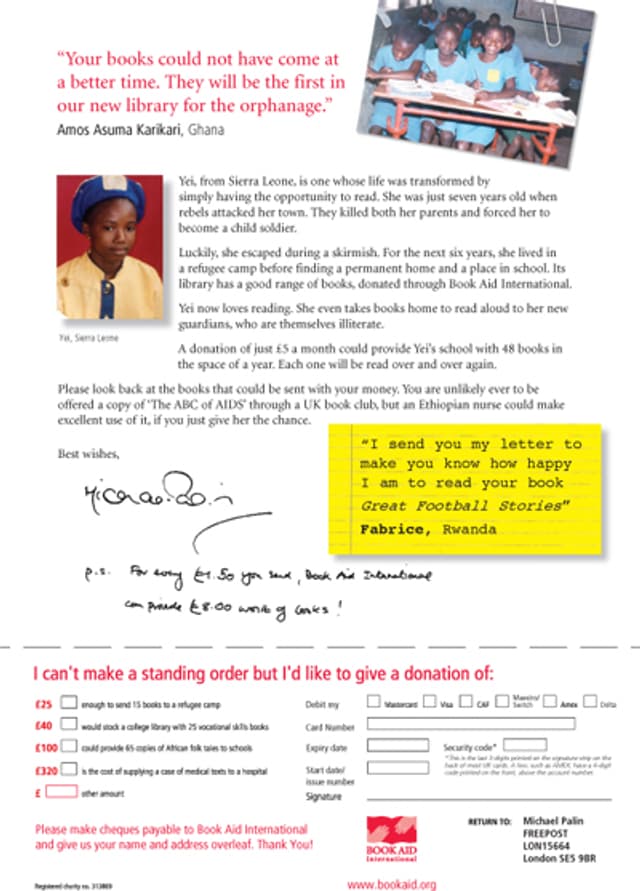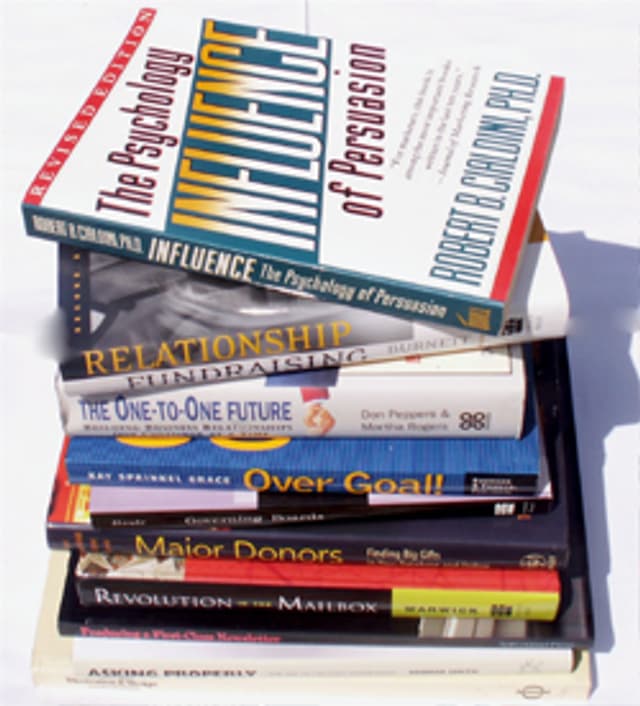Book Aid International: the Reverse Book Club
- Exhibited by
- Jacqui Scott.
- Added
- June 20, 2010
- Medium of Communication
- Direct mail
- Target Audience
- Individuals, planned gift, regular gift, single gift
- Type of Charity
- Education, public / society benefit
- Country of Origin
- UK
- Date of first appearance
- 2002
SOFII’s view
This medium level structured monthly giving scheme is a good example of a fundraising product that has been specifically designed to fit the needs of donors to a very particular and specific cause. Its appeal to book-lovers is obvious and because such schemes can generate large income at relatively low cost it seems likely to provide Book Aid International with a substantial, reliable income as it grows. Nonprofits not directly dealing with books may not be able to copy it exactly, but it should inspire some to find their own equivalent offer.
Creator / originator
Book Aid International / Ken Burnett.
Summary / objectives
BookAid International promotes literacy in developing countries by creating reading and learning opportunities for disadvantaged people, in order to help them realise their potential and eradicate poverty. Book Aid International sends half a million books every year to individuals and communities in the developing world where there is a great hunger for good quality, appropriate learning materials.
But Book Aid International is a small and relatively unknown charity. Although it benefits from great support from the UK publishing industry, other areas of funding are not so secure, and other support is often inconsistent, even unreliable. In the early 2000s, it became clear the Book Aid International was likely to reach an end of its long funding relationship with the UK Department for International Development, leaving it wholly voluntarily funded. To bridge this gap, and develop its work Book Aid International needed to raise reliable and regular amounts of money from the public. So it decided to develop a distinctive monthly giving scheme.
Hence the Reverse Book Club. RBC is just like a normal book club, only its members never receive the books – instead each month four books are sent on each member’s behalf to people in the developing world.
Background
Book Aid International needed a cost-effective way to recruit regular donors. The RBC is ideal and very compatible with their image. Book Aid International’s offer is simple, yet very effective:
Four books for £5.00 - and you never receive a single one of them!
With normal book clubs, members pay a monthly fee and get offers for lots of books that, quite often, they don't really want. Book Aid International’s Reverse Book Club is a bit different. Here members pay a minimum of £5.00 each month, and Book Aid International sends them... nothing at all.
People in developing countries need regular, reliable help to break out of the cycle of poverty. It costs Book Aid International just £5.00 to send four carefully selected books to libraries for readers of all ages in Africa and elsewhere. A donation of just £5.00 a month, therefore, means Book Aid International can provide 48 books each year to readers in countries such as Ethiopia, Zambia and Sierra Leone.
Donors love this scheme for its tangible accountability. For a small weekly outlay that most will never miss, they can see what their help is achieving and can readily imagine the impact of their gift, month after month, on small children and struggling students, eager to learn and to work their way out of poverty.
Special characteristics
A distinctive and different monthly giving club with lots of opportunities for upgrades and special appeals too. And before long Book Aid International will also be able to develop opportunities for legacy (bequest) giving from its growing and increasingly loyal donor base of RBC members.
Influence / impact
Members of the Reverse Book Club have so far enabled Book Aid International to send well over 100,000 books to people in the developing world.
Details
All mailing lists and media are rigorously tested with response data scrupulously monitored and reviewed. This ensures Book Aid International can be responsive to any changes in acquisition costs.
Costs
Direct mailing packs average a cost of around £0.43p, and the cost per donor recruited has averaged to date around £80.
Results
On average, the RBC mailings have achieved a response rate of around 0.8 per cent; an ROI of around 60 per cent in year one; average monthly regular gifts of £6.09, and average cash gifts of £29.00.
Merits
Book Aid International’s RBC is a good, solid, well-structured monthly giving scheme built around a strong concept and name. It has worked fabulously well for Book Aid International.
Other relevant information
In June 2007, Book Aid International tested a large inserts campaign using the Reverse Book Club concept. Previous inserts had been tested, but only on a very small scale. Utilising media that had been tested through mailings, and bringing in a range of test media, the inserts campaign has performed fantastically, achieving an ROI of around 142% in year one.
As a logical example of brand extension the RBC has introduced the concept of the Reverse Book Token. This is a colourful gift certificate that RBC members and others can send to their friends and families. The book tokens cost £10.00 each and not only raise money but also promote membership of the Reverse Book Club. Of course, once again the recipient of an RBC book token doesn’t get the books – a young student in Africa or Asia does.
UPDATE:
See the latest RBC cold acquisition pack and
read about the concept that inspired the creation of SOFII.
See also The Great Fundraiser’s Bookshelf – somewhere else you get inspiration and guidance for your fundraising.
 View original image
View original image


















